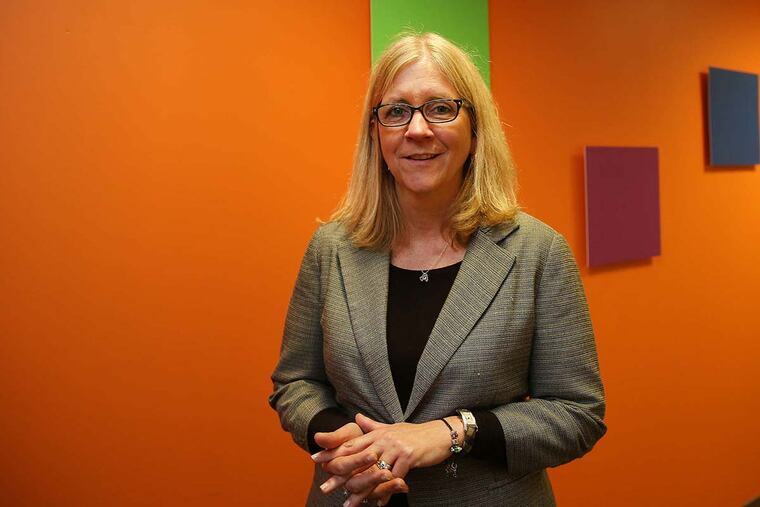Clarifi's Patricia Hasson, on reverse mortgages, millennials' savings
When it comes to money know-how, talking is key, particularly when senior citizens are considering reverse mortgages. "I would encourage you to go to a counseling agency with your children," said Patricia Hasson, 53, president and executive director of Clarifi, the financial counseling and education nonprofit now celebrating its 50th year.

When it comes to money know-how, talking is key, particularly when senior citizens are considering reverse mortgages.
"I would encourage you to go to a counseling agency with your children," said Patricia Hasson, 53, president and executive director of Clarifi, the financial counseling and education nonprofit now celebrating its 50th year.
(People old enough to qualify for reverse mortgages might remember the nonprofit's legal name, the Consumer Credit Counseling Service of Delaware Valley.)
Reverse mortgages allow homeowners to tap into their home's equity, making no monthly payments until they move out, sell or die. Then the senior's descendents may have to pay off the reverse mortgage if they want to keep the house, or they may get less money when the home is sold. Some seniors sign up for reverse mortgages without telling their adult children.
"It's uncomfortable," Hasson said, "because they don't want to tell their family they did this because they really can't afford the monthly bills.
"And if it's your family that's living with you, if they understood, perhaps they would be willing to support more. The child might say, 'You know what, I'll give you money,' as opposed to using the equity in the home."
I can imagine you might have some pretty upset adult children.
People are afraid to talk about money. But, have the conversations - earlier. [Seniors] don't ask for help. Then the child finds out later there's a lien against the home from a reverse mortgage - you're doing more damage.
Speaking of conversations, let's flip to the millennials and student debt.
I think there are a lot of families who don't have that honest conversation with their children. You have to look at the cost of college - not only where you want to go and what your major might be. My daughter was very cognizant of that, and she does not want to graduate with a lot of student loan debt.
Young people carry a big financial burden.
We did a workshop here, what we call boot camp, with millennials, and one of the best things to come out of that was they all were very interested in retirement savings and starting to save for retirement.
Really? They are thinking of retirement at that age?
When you show somebody in their 20s the difference between putting a little away in their 20s versus how much they're going to have to pay in their 30s or 40s to catch up, they get it.
What else should young people consider?
One mistake we see a lot of students making now is everything's on your debit card. They're swiping everything, so they're not clear where that money is going.
During the recession, unemployment caused many financial hardships. What are you seeing now?
Now it is underemployment. People who have jobs are not at the same salary. They used to be making a lot of overtime. They're not even getting 40 hours anymore; they're getting 32.
Everyone thinks the job market is great.
There isn't enough understanding that when you don't have income for six months [or so], you dig yourself into a hole. It's not like you get out of that hole in six months.
So what's happening with those people?
They're still trying to catch up. You still may have some credit-card debt. You're making your mortgage payment, but may be behind on your electric bill.
You've dealt with so many financial issues: predatory lending, payday loans, credit-card fraud, budgeting problems, credit-report errors. What really gets you aggravated?
So many things constantly arise that charge fees and take money out of the hands of hardworking people. It really is like playing Whack-a-Mole. We see one bad practice, call attention to it, and another pops up to replace it.
Interview questions and answers have been edited for space.
215-854-2769@JaneVonBergen
PATRICIA HASSON
Home: Havertown.
Family: Husband, Patrick; children, Brad, 30; Sydney, 18; Kerry, 15; Matthew, 10.
Diplomas: Archbishop Carroll High School; University of Dayton, finance; Villanova, master's in business.
Career: Began in banking, in auto finance, credit cards. Transitioned to nonprofit when daughter was born.
Hobbies: Golfing, Phillies.
Tempted to overspend: On clothes. "I'm also good at returning."
She's a pro: At using coupons for food, clothes.
Also: Board member, Federal Reserve Bank, Philadelphia.
CLARIFI
Mission: Philadelphia nonprofit provides financial counseling, education; debt management; foreclosure avoidance to 20,000 clients.
Where: Philadelphia, Montgomery, Bucks, Chester, Delaware, Burlington, Salem, Camden, Cumberland, and Gloucester Counties, state of Delaware, at 20 offices.
Dollars: $6.1 million 2014 revenues from contributions, government grants.
Employees: 54.